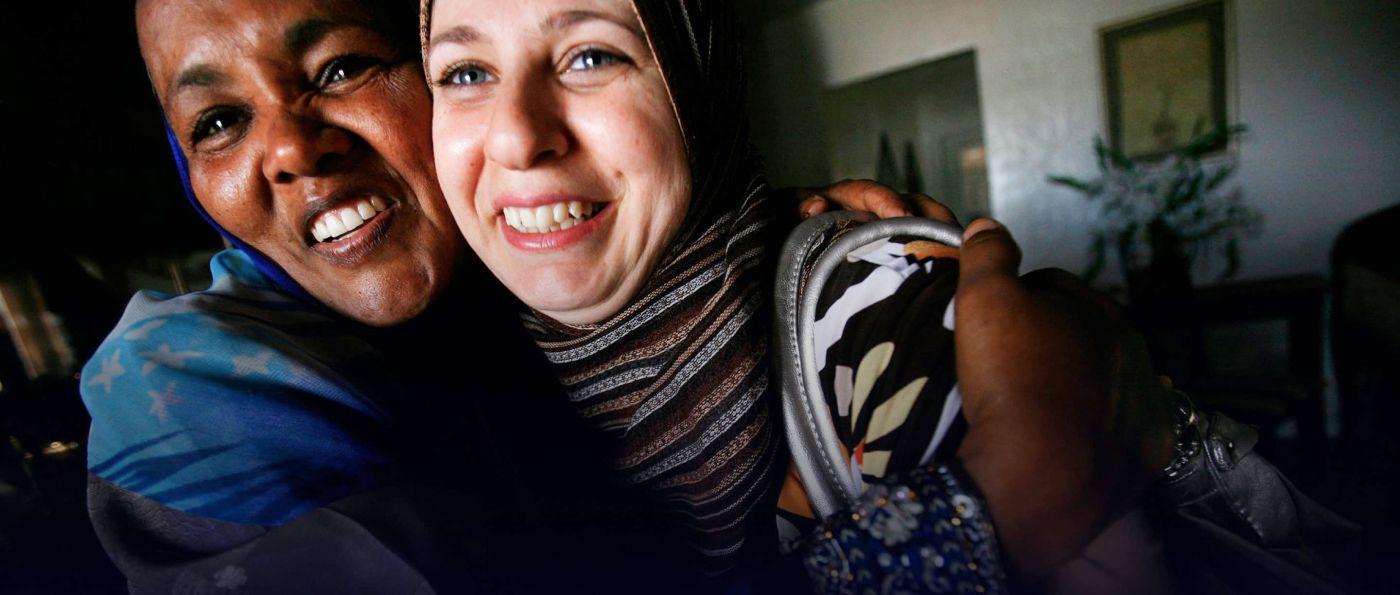

A Q&A WITH Dr. Suzy Ismail of Cornerstone Marriage and Family Intervention
Mental health as a human right is the foundational theme of World Mental Health Day—a day to unite communities, raise awareness, and improve understanding of global mental health issues. Welcome.US spoke with Dr. Suzy Ismail (pictured above), MCIS, MPhil, PhD, AAPC, founding director of Cornerstone Marriage and Family Intervention—a Welcome Fund grantee—about the mental health needs, trends, and challenges that newcomers face when relocating to the U.S.
Mental health can be a difficult topic for people to address—and it’s still a taboo topic in many communities. How do you encourage newcomers to understand the importance of prioritizing their mental health and seeking support?
One of the ways that we think is a very powerful technique to capture the interest and destigmatize mental health conversations and mental health care really has to do with the power of language. Here in the U.S., we tend to be very low in terms of contextualism, meaning we spell things out, we are very blunt and direct. In many other communities, particularly among collectivist communities, which is where many of the refugee clients we work with come from, language is much more metaphoric and flowery. There is a greater, higher level of contextualism. A lot of times we lose that connection with clients in trying to convey to them the importance of seeking mental health because of the language and the way we try to translate words that can be very off putting.
A lot of people call us Cornerstone Counseling, but we’re not. Our organization is actually Cornerstone Marriage and Family Intervention. …When you use a term like intervention, guidance or advice, it sounds more like assistance, and that is much more accessible and amenable to those who need the help the most.
It is a traumatic experience when individuals or families are displaced from their homes because of war, violence, poverty, political crisis, or natural disaster and must relocate to a new country. What are some of the common or recurring mental health challenges that newcomers face?
Post-traumatic stress disorder is something that we see. It often doesn't manifest in the way we may expect it to… but instead in what we may translate as anger episodes, in difficulty focusing, of not being able to maintain a job, or fear of working. A lot of times, something like PTSD looks different than what we may think it should look like, but it impacts the way that people communicate, the way that those who have been through the trauma respond to the world around them, and essentially their trauma response instincts that you're seeing.
We do tend to see several different types of OCD behaviors. Scrupulosity tends to be a common one, which is an OCD behavior linked to religious rituals, because many times there is religious trauma, or sometimes it is religion that is at the core of emotional resilience for clients coming from these collectivist communities. And then, we see depression and anxiety. But again, it often manifests differently with the refugee communities than how we may expect to give a clinical diagnosis to those who have not been through forced migration trauma.
When relocating to a new country, the to-do list is long—jobs, housing, education, etc. Where should mental health be prioritized, and why?
One of the things that we've noticed is that trying to head right in with, “Hey, we're here to support you emotionally and mentally,” really was not working. Our interventions were met with rejection right away and being told, “I don't need that. What I need is a job. What I need is food on the table. What I need is a roof over my head.” What we started to do—and many of our interventionists are very skilled in this area—is approach the client, asking them, “What are your needs? What are you struggling most with?” Of course, the list is long, and usually emotional, mental wellness doesn't really make it to the list.
What we'll do is start to work with the client on creating almost like a SWOT analysis. What are the strengths in moving forward with this area? What would be the weakness of not focusing on this? And in so doing, by tackling that to-do list that you mentioned, being able to tackle it from a wellness perspective. Usually what we see is, after three, four, or five sessions of talking about the resume, maybe looking at Indeed and understanding how it works, there's a trust that's developed with the interventionist. And now we're ready to start exploring a little bit like, “Hey, when we were talking about getting the kids enrolled in school last week, I noticed that there was a bit of a hiccup in your voice and you seem to get a little bit emotional. What was going on with that?”
We think language is so powerful and so important because you can pick up on things—certain nonverbal cues, certain elements of that are not the same across cultures. So when you've got an interventionist who shares the culture, who shares the language, and who's able to convey and communicate in that way, you can take on certain mental and emotional elements that are evident in the conversation that you would never be able to pick up on if you just have a translator or an interpreter in the room.
How can Welcomers and communities play a role in supporting newcomers and creating space for conversation about both physical and emotional well-being?
We often reference Greg Mortenson’s Three Cups of Tea. The idea of Three Cups of Tea is that you don't really connect with someone, particularly a migrant who's going through the process of resettlement, until you've had three cups of tea with them. And this is not like gulping down three cups in a row, but actually sitting with them and genuinely enjoying those three cups of tea.
Since our culture tends to be very monochronic, we're very much about “your time is money.” What we're looking at with many collectivist communities is a chronic approach where I have all the time in the world, why do you want to rush things? Why are we running? And that's in direct contrast to what we see, for example, in a traditional therapeutic intervention. The therapist is kind of really encouraged by the insurers to provide a diagnosis and have a diagnostic code within that first hour session that they have. It doesn't work that way. When you really want someone to open up to you so that you can explore what is happening mentally and emotionally, it's not about a bottom line, about a diagnosis. It's about understanding them. Our motto is that you really can't do that until you've had at least three cups of tea with the person.
I would say, as community members [who] are welcoming newcomers…recognizing it's not going to be on our timeline. And as much as we may see that someone is struggling and needs help, we also have to respect their autonomy and their ability to pace themselves in a way where they're ready to receive help. That doesn't mean we leave them and ignore them like, “Well, if you're not going to help yourself, then there's nothing I can do.” No, we continue to drink tea with them until they're ready to take that next step, knowing that we are there and we're ready to guide them to where they need to be.
More stories of welcome



Stories of Welcome
Hoosier hospitality: How Patchwork Indy is creating a more welcoming state
December 11, 2024


